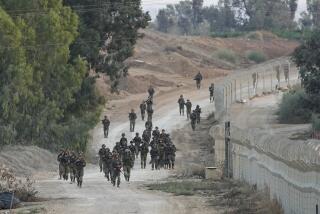Intelligence Ignorance
- Share via
At almost the same moment that the Senate was voting for a $305-billion military budget in 1990, President Bush was candidly acknowledging to reporters that “we’re dealing with less than a full deck” when it comes to knowing what’s going on in Lebanon. The Senate’s action and Bush’s lament again underscore one of the harsher truths about the limits and possibilities of national security efforts. Hundreds of billions are each year devoted to defense and billions more to the intelligence services, but for all this mighty endeavor the United States still finds itself baffled and frustrated as it tries to respond to the barbarism of a handful of fanatics. Those who remember the Iran hostage crisis of a decade ago will recognize the bleak familiarity of those feelings.
Ignorance about the adversaries the United States now faces in Lebanon--about who they are and how they can best be dealt with--may well be irremediable, given the seemingly impenetrable clannishness of the most extreme of Lebanon’s anti-American factions. The broader shortage of good tactical intelligence about Lebanon and other Third World countries is less excusable. For decades, the focus of U.S. intelligence efforts has been on technical information-gathering, especially with regard to the Soviet Union and its allies. The results have been impressive, in some cases remarkable. But one consequence of this heavy emphasis--which disturbed many intelligence specialists even as it was occurring--has been that human intelligence efforts in areas of lesser importance, like Lebanon, have been slighted.
The United States used to be able to count on informers within the Palestine Liberation Organization and on close cooperation with Israeli intelligence to keep up with who was who and what was what in Lebanon. But Iran’s revolution in 1979 and Israel’s invasion of Lebanon in 1982 changed the picture greatly by encouraging the emergence of the long-neglected Lebanese Shiite minority as a major political force. The Hezbollah, the most pro-Iran and anti-Western of the Shiite groups, is composed mainly of people who are related to or otherwise know each other. Organizations can often be penetrated by intelligence services; families and cliques are another matter. It is the solidarity and secretiveness of Hezbollah that now make intelligence-gathering in Lebanon so hard.
The outrages that have been committed in Lebanon--the original seizure of hostages and the apparent murder of Lt. Col. William R. Higgins--cry out for an effective response. The key word here remains effective . Everyone wishes something could be done. What is still lacking, as the President conceded this week, are the essential facts to decide what should be done. Ignorance adds to the frustration. It also points up the need to fill existing political intelligence gaps--and by no means in Lebanon only--as quickly and to the fullest extent possible.
More to Read
Get the L.A. Times Politics newsletter
Deeply reported insights into legislation, politics and policy from Sacramento, Washington and beyond. In your inbox twice per week.
You may occasionally receive promotional content from the Los Angeles Times.










